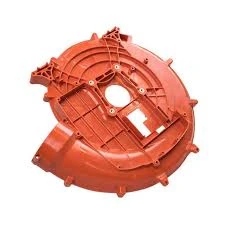Mobile:+86-311-808-126-83
Email:info@ydcastings.com
1% Copper End Cap for Enhanced Performance and Durability in Plumbing Applications
Understanding 1% 202% Copper End Caps Applications and Benefits
Copper end caps play a significant role in various industries, from plumbing to electrical engineering. At first glance, the concept of a 1% 202% copper end cap may seem complex, but a closer look reveals its importance and applications. This article will discuss the composition, applications, and benefits of these unique copper end caps.
Composition and Properties
Copper end caps are industrial components that are typically used to close the ends of pipes or tubes. They are essential for ensuring a secure fit, preventing leaks, and providing structural support. The term 1% 202% copper end cap likely refers to a specific alloy composition where copper (Cu) is combined with other elements.
In general, copper is known for its excellent conductivity and corrosion resistance, making it an ideal material for various applications. The percentage in 1% 202% may indicate alloying elements that enhance the mechanical properties of copper. For instance, the addition of phosphorus can improve its strength and resistance to pitting, while nickel can enhance its corrosion resistance.
Applications
Copper end caps have a wide array of applications across different fields
1. Plumbing In plumbing systems, copper end caps are commonly used to close off the ends of copper pipes. They help in maintaining the integrity of the plumbing system, preventing leaks, and ensuring that water or gas can flow only where intended.
2. Electrical Engineering Copper’s high conductivity makes it a staple in electrical applications. Copper end caps are often used in electrical connectors and terminals, ensuring a reliable connection in various devices and systems.
3. Construction In construction, copper end caps can be found in heating and cooling systems, where they help in sealing pipes and preventing thermal losses.
1 2 copper end cap

4. Manufacturing Many manufacturing processes require the use of copper end caps to keep systems sealed and efficient. In this context, they help maintain pressure and control the flow of materials.
Benefits of Using Copper End Caps
1. Durability Copper is inherently resistant to corrosion, making copper end caps particularly robust, even in harsh environments. This durability reduces the need for frequent replacements, saving both time and money.
2. Conductivity One of the most significant advantages of using copper end caps is their excellent electrical conductivity. This property ensures efficient energy transmission in electrical applications, reducing energy loss.
3. Aesthetic Appeal In architectural designs, copper elements can provide a unique and attractive aesthetic. When used in visible applications, such as fixtures and fittings, copper end caps add a touch of elegance and sophistication.
4. Resistance to Bacteria Copper has natural antimicrobial properties, which can help in reducing the prevalence of bacteria in plumbing systems. This characteristic is particularly beneficial in medical facilities and food processing plants, where hygiene is paramount.
Conclusion
In summary, 1% 202% copper end caps are versatile components with a significant role in various industries. Their unique alloy composition enhances the properties of copper, making them suitable for applications in plumbing, electrical engineering, construction, and manufacturing. The benefits of durability, conductivity, aesthetic appeal, and resistance to bacteria make copper end caps an excellent choice for ensuring the efficiency and integrity of various systems.
As industries continue to evolve and demand higher quality materials that can withstand diverse environmental conditions, the relevance and importance of specialized components like copper end caps will only grow. Understanding their composition and applications will enable engineers and manufacturers to make informed choices, ultimately leading to more efficient and sustainable practices in their respective fields.
-
Valve Body Acts as the “Heart” of Flow ControlNewsMay.19,2025
-
Understanding the Importance of ImpellersNewsMay.19,2025
-
Importance of Automobile Water PumpsNewsMay.19,2025
-
How an Engine Oil Pan Works to Keep Your Car LubricatedNewsMay.19,2025
-
Common Materials Used in Pump Impeller ManufacturingNewsMay.19,2025
-
Ball Valve Casting in Modern Pipeline SystemsNewsMay.19,2025











